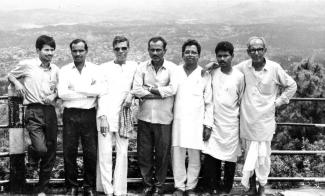
When I first met comrade ‘Shishir' (that was then one of DP Bakshi’s party names) probably in early 1977 or thereabouts, he was walking with crutches. He looked rather unimpressive – just a man in the street. Incidentally, this was a quality that would save him from the political police a year or so later. The cops raided an underground shelter and took into custody the few comrades available there. But they left comrade Pranab alone when he said, very convincingly, that he was only a cook-cum-servant.
To come back to our first rendezvous. I said he "looked unimpressive", but when we began to talk, I was really impressed with the way he was listening to what I had to say with rapt attention and came out with very precise and convincing responses. Later I came to see that it was precisely this quality of integrating with comrades that lay at the root of his widely acclaimed success in developing new and not so new comrades wherever he worked. To an extent this was a positive by-product of the otherwise undesirable underground conditions of work that had been imposed on us, where professional revolutionaries had to work, in most cases, through local cadres and everything depended on your success in politically educating and activating the latter. Comrade Pranab retained this quality even in the changed conditions of normal overground work, something many of us failed to do.
I love to remember meeting comrade Pranab in Shillong, where I was sent for rest and recuperation, in 1981 or early 1982. He was then working in Assam. I was astonished to see his fluency in the Assamese language. To be sure, he was not a great linguist, but he had learned the language just the way a child learns her mother-tongue -– through affection and a sense of belonging. With great enthusiasm he told me about the history, politics and cultural heritage of Assam, for example, about how Jyoti Prasad Agarwala who belonged to a family that had hailed from Marwar in Rajasthan, was loved and respected as a cultural icon of Assam, and so on. I saw that he could feel the pulse of the people, respected their culture and nationality sentiments and that was why he was able to creatively implement the party line on Assam movement in perfect understanding with the local comrades.
I had the opportunity to observe from close quarters another less known aspect of comrade Pranab’s political personality – his penchant for theoretical work. All of us speak about the need for regular party education; he was one of the few who really enjoyed engaging himself with party classes at various levels, never complaining ‘where is the time?’
In the present period of expansion and diversification of work in the face of a very complex and challenging situation, the party needs a steady supply of cadres with a firm grasp of the Marxist worldview and the party line. And for that, we need leaders like comrade Pranab, who was the party's man for all seasons for some forty years.
Liberation Archive
- 2001-2010
-
2011-2020
- 2011
- 2012
- 2013
- 2014
- 2015
- 2016
- 2017
-
2018
- January-2018
- February-2018
- March-2018
- May 2018
- June-2018
- July 2018
- August 2018
-
September 2018
- Resolve of Independence Day 2018: End the Disastrous Modi Regime to Stop the Lynch Mobs and Loot Brigades
- Atal Bihari Vajpayee And The Evolution Of The Indian Right
- Defeat the BJP's Divisive Agenda over NRC
- ABP Resignations: The Truth Of A Modi-Managed And Modi-Muzzled Media
- Sanghi Terror Out In The Open
- Banking Sector And Modi Govt
-
Comrade DP Bakshi (17 May 1948 – 26 July 2018)
- Outstanding Communist Organiser And Inspiring Representative of the Revolutionary Legacy and Spirit of Naxalbari
- He Touched the Hearts and Minds of All Who Knew Him
- A Man for All Seasons
- Comrade Bakshi Is Very Much With Us
- Unforgettable Role in Building the Party in Assam
- An Eye For Detail
- An Inspiration for Railway Comrades
- He Lived For The Party
- From Seventeen to Seventy, A Dedicated Life for Revolution
- Baba, My Comrade!
- Muzaffarpur Shelter Home Rapes: Dark Underbelly of 'Beti Bachao'
- Farmers Court Arrest on August 9 During Countrywide Jail Bharo
- Tea Workers' Strike in West Bengal
- Report of Fact Finding Team on Undeclared Emergency-Like Situation in Tripura
- Kuldip Nayyar: Tireless Defender of Democracy
- Adieu, Prof. Samir Amin
- International Solidarity: Attempt to Attack Bolivarian Revolution Fails
- Stop the repression of students in Bangladesh!
- Disturbing Reports of Persecution of Muslims in China
- Comrade Somnath Chatterjee
- Stand With Kerala!
- October 2018
- November 2018
- December 2018
- 2019
- 2020
- 2021-2030
Charu Bhawan, U-90, Shakarpur, Delhi 110092
Phone: +91-11-42785864 | Fax:+91-11-42785864 | +91 9717274961
E-mail: info@cpiml.org




